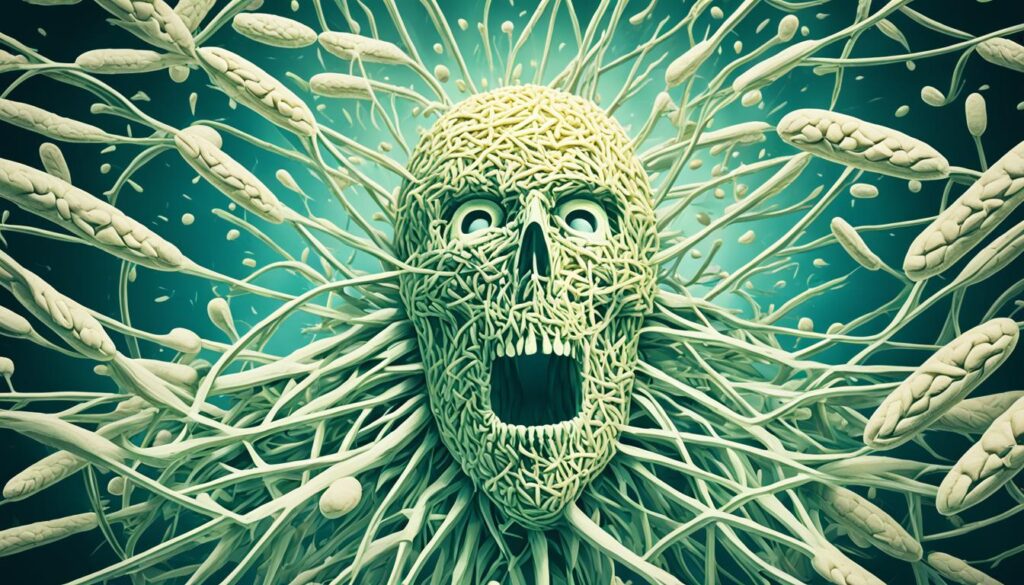Living in the United States, I’ve noticed a lot of talk about gluten and its effects. People are asking, “Can gluten cause panic attacks?” This question isn’t just a rumor anymore. With more people choosing gluten-free diets, the food industry is changing. I started looking into how gluten might affect our mental health, especially with concerns about anxiety.
Celiac Disease and Gluten Sensitivity are well-known health issues. Celiac is genetic, while Gluten Sensitivity is not as clear-cut. But what’s interesting is how mental health might be linked to gluten. People with bipolar disorder and those with Celiac Disease often feel better on a gluten-free diet. This shows how food can affect our mental state.
With more people going gluten-free, health care and the food industry are taking notice. Now, functional medicine and personalized nutrition are getting attention. They offer new ways to help people deal with gluten’s effects.
Key Takeaways
- Gluten-free diets are not just a fad, but a response to a real concern over gluten-induced anxiety.
- A genetic disposition to Celiac Disease can tangentially affect mental wellness.
- The relationship between Autism Spectrum Disorders and gluten sensitivity suggests dietary interventions could be pivotal.
- Ongoing dialogue on gluten’s impact on mental health indicates the depth and complexity of this issue in health care.
- The food industry’s pivot towards gluten-free products mirrors the public’s increasing attention to the ties between diet and psychological well-being.
- The partnership of functional medicine with personalized nutrition education heralds a new era of integrated health care.
Understanding Gluten and Its Effects on the Body
Gluten is a protein in wheat, barley, and rye that gets a lot of attention for its health effects. It’s known for causing stomach problems, but it also affects the brain and nerves. This can lead to feelings of anxiety and even panic attacks in some people.

People with celiac disease or non-celiac gluten sensitivity (NCGS) can have many symptoms after eating gluten. Celiac disease can cause the body to attack itself, harming the gut. NCGS is less severe but can make people feel tired, irritable, and anxious.
What is Gluten and How Does It Impact Digestion?
Gluten mainly affects the digestive system, causing bloating, gas, and diarrhea. This can lead to not getting enough nutrients, which might be mistaken for other health problems. But gluten’s effects can also reach the brain, possibly linking it to panic attacks in some cases.
The Immune Response to Gluten in Celiac Disease and NCGS
Celiac disease makes the immune system attack the small intestine when it reacts to gluten. This can harm digestion and how the body absorbs nutrients. NCGS also triggers an immune response, causing inflammation and similar symptoms. This can make people feel anxious and may lead to panic attacks.
| Condition | Common Psychological Symptoms | Frequency of Symptoms |
|---|---|---|
| Celiac Disease | Depression, Anxiety, Panic Attacks | High |
| Non-Celiac Gluten Sensitivity | Brain Fog, Irritability, Mood Swings | Variable |
| Gluten Ataxia | Coordination Issues, Cognitive Impairment | Low but significant |
Understanding the effects of gluten on health is key to managing anxiety and other mental health issues. The link between gluten and mental health is complex. It highlights the need for more research and education for patients.
Exploring the Gut-Brain Connection
Our gut and mental health are closely linked, say scientists. This link, known as the gut-brain axis, lets our gut and brain talk to each other. What happens in our gut can affect our mood and how we think, making diet important for our mental health.
The Role of Gut Health in Mental Well-being
Research shows a healthy gut is key for our mental health. Studies like Daulatzai’s 2015 findings show gluten sensitivity can harm our gut and brain. This means eating a gluten-free diet for anxiety might help those sensitive to gluten.
Eating foods rich in antioxidants and probiotics can also boost mental health. These foods help feed the brain and keep the gut healthy.
How Intestinal Permeability May Influence Anxiety Levels
Gluten can change how our gut absorbs things, affecting gluten and mood swings or gluten and panic disorder. If our gut lining gets damaged, it can let harmful substances into our bloodstream. This can make anxiety and panic worse.
A study in 2012 by Ait-Belgnaoui et al. found that fixing gut leakiness can help control stress. This is key for managing anxiety.

| Study | Year | Findings |
|---|---|---|
| Daulatzai | 2015 | Non-celiac gluten sensitivity can trigger gut dysbiosis and neuroinflammation. |
| Ait-Belgnaoui et al. | 2012 | Probiotic treatment prevented gut leakiness and reduced stress response. |
| Neufeld et al. | 2011 | Germ-free mice showed reduced anxiety-like behavior. |
These studies suggest a gluten-free diet for anxiety could be helpful, especially for those with gluten sensitivity. By reducing inflammation and keeping the gut healthy, people might see better mental health and overall well-being.
Can Gluten Cause Panic Attacks?
In my search to understand how diet affects mental health, I found some interesting links between gluten and anxiety. Many wonder, “can gluten cause panic attacks?”. This question comes from how gluten affects some people’s immune and nervous systems.
Gluten and panic attacks are connected in complex ways. For those with celiac disease or gluten sensitivity, eating gluten can cause more than just stomach problems. It can lead to anxiety and even panic attacks.

Gluten can start inflammation in the body, which might affect the brain. This inflammation can make neurological symptoms worse. Studies show that people with gluten-related disorders often have more brain inflammation. This can make them more likely to have panic attacks.
Here’s a look at how common some health issues are:
| Condition | Percentage of Patients Affected |
|---|---|
| Neurological/Psychiatric symptoms in celiac disease | 17% |
| Depressive symptoms in young adults with celiac disease | 35% |
| Anxiety and depression in pediatric celiac disease patients | 30% |
| Non-celiac gluten sensitivity symptoms mimicking celiac disease | 18% |
These stats show that gluten can really affect mental health. For those with gluten intolerance or celiac disease, avoiding gluten can help their health. It might also lessen anxiety and panic attacks.
People who have stopped eating gluten say it helps with anxiety. The exact reasons for this are complex, involving immune reactions and gut health. But, stories from these people match what science says about gluten and panic attacks.
As I keep looking into this, the link between gluten and anxiety is still a big topic. The way our diet affects our mental health is important to understand. It’s especially true for those who are already anxious.
Psychological Disorders and Gluten Sensitivity
Studies now show a strong link between gluten sensitivity and mental health issues. Gluten might affect how we feel and think. This means people with certain mental health problems might see improvements by avoiding gluten.
Conditions like autism, schizophrenia, depression, and anxiety might be linked to gluten. This highlights the importance of watching what we eat.
Link Between Gluten and Autism Spectrum Disorders
Many people with autism find that going gluten-free helps. This diet change can ease stomach issues and help with social skills. It might also lessen stress by reducing inflammation.
Schizophrenia and the Incidence of Gluten Intolerance
Schizophrenia and gluten sensitivity seem to be connected. Some people with schizophrenia get worse when they eat gluten. Cutting down on gluten can help manage their symptoms.
Depression, Anxiety, and Gluten: What's the Connection?
Gluten’s effect on mood is still being studied. But, eating gluten can make depression and anxiety worse. This shows gluten could be a factor for those with mood issues. Dietary changes might be part of the solution.

| Year | Study Findings | Relevance to Mental Health |
|---|---|---|
| 2009 | Higher rates of depression in people with celiac disease. | Shows correlation between gluten intolerance and depression. |
| 2014 | Reintroduction of gluten increases depression symptoms. | Direct link between gluten consumption and depression severity. |
| 2020 | Correlation between immune response to gluten and psychiatric responses. | Indicates gluten’s potential impact on mental health beyond digestive symptoms. |
Understanding how gluten affects mental health is key to better living for those who are sensitive to it. By avoiding gluten, some mental health symptoms might be easier to manage.
The Emerging Research on Gluten and Panic Disorder
Recent studies show a strong link between gluten and panic disorder. They suggest that a gluten-free diet could help those with anxiety. This research is uncovering how diet affects mental health.
Evidence of Gluten-Induced Anxiety in Medical Studies
Studies have found gluten can make anxiety worse in some people. For instance, a study with 283 people with celiac disease showed many had anxiety. Even on a gluten-free diet, some didn’t see much improvement.
Another study found eating gluten for three days made people feel more depressed. Depression often goes hand in hand with anxiety. A year on a gluten-free diet helped reduce anxiety in those with celiac disease.
Patient Accounts of Anxiety Reduction After Eliminating Gluten
Many people who cut out gluten say they feel less anxious. Their stories add a personal touch to the research. It shows how a gluten-free diet can help manage anxiety.
The table below shows how gluten affects anxiety and how a gluten-free diet can help.
| Study Population | Details | Effect on Anxiety |
|---|---|---|
| 35 People with Celiac Disease | Followed a gluten-free diet for 1 year | Decrease in anxiety |
| 20 People with Celiac Disease | Higher levels of anxiety before diet, which decreased after 1 year | Decrease in anxiety |
| 283 People with Celiac Disease | High incidence of anxiety, but no significant change after diet | No significant change |
| 23 People with Non-Celiac Gluten Sensitivity | Reported reductions in anxiety after diet | Decrease in subjective feelings of anxiety |
| 22 People with Non-Celiac Gluten Sensitivity | Consumed gluten for 3 days | Increase in symptoms of depression |

Both studies and personal stories suggest a gluten-free diet can help with anxiety. As research grows, it looks like diet could be key for better mental health in those with gluten sensitivity.
Adopting a Gluten-Free Diet for Anxiety Management
More people are trying a gluten-free diet to help with anxiety. This diet can improve health beyond just the gut. It may also help reduce anxiety and boost overall well-being.
Benefits of a Gluten-Free Diet Beyond Digestive Health
Going gluten-free can do more than just ease stomach issues. It can also help with anxiety. People may feel less anxious, have better mood control, and experience fewer panic attacks.
This diet works by lowering inflammation and improving how the gut and brain talk to each other. These changes can make anxiety symptoms less severe.
Navigating the Challenges of Going Gluten-Free
Starting a gluten-free diet has its hurdles. It’s important to avoid gluten to keep feeling good. Finding gluten-free foods that taste good can also be hard at first.
Getting help from dietitians and health experts can make the switch easier. They can offer advice and support for a lasting change.

| Condition | Number of Patients | Studies | Age Group |
|---|---|---|---|
| Irritable Bowel Syndrome (IBS) | 229 | 13 | Adults |
| Celiac Disease/Non-Celiac Gluten Sensitivity (CD/NCGS) | 111 | 13 | Adults |
| Fibromyalgia | 75 | 7 | Adults |
| Autism Spectrum Disorders (AS) | 175 | 2 | Children (3-17 years) |
This data shows how a gluten-free diet can help with more than just digestive issues. It can also support mental health. For those with gluten sensitivity and anxiety, this diet could improve their life quality.
Conclusion
This exploration has looked into whether gluten can cause panic attacks. We found a strong link between gluten sensitivity and anxiety. Gluten’s effects go beyond the stomach, touching our mental and emotional health.
Studies show that eating gluten can harm nerves and change gut bacteria. This can make anxiety worse through the gut-brain link. For those with unexplained nerve issues, gluten could be the cause.
Not getting enough B vitamins, vitamin D, magnesium, and omega-3 can make anxiety and depression worse. These nutrients are often lacking in people with gluten sensitivity.
Going gluten-free might help those with these issues feel better. It’s not just a choice; it’s a treatment for gluten-related health problems. It affects both body and mind.
This overview aims to show how gluten can affect anxiety and panic. It highlights the need for careful eating to improve mental health. I hope it offers useful insights into the link between diet and mental well-being.
FAQ
Can gluten cause panic attacks?
Yes, for some people, eating gluten can lead to anxiety and panic attacks. This is more common in those with gluten-related disorders like celiac disease or non-celiac gluten sensitivity (NCGS). But it’s not a direct cause of panic attacks for everyone.
What is gluten and how does it impact digestion?
Gluten is a protein in wheat, barley, and rye. It can cause an immune reaction in some, leading to bloating, gas, and diarrhea.
How does the immune response to gluten in celiac disease and NCGS affect the body?
In celiac disease, gluten starts an autoimmune reaction that harms the small intestine. NCGS also causes symptoms that affect the gut and overall health.
What role does gut health play in mental well-being?
The link between the gut and brain shows that gut health affects mental health. A healthy gut helps the brain work better. But an unhealthy gut can lead to anxiety and depression.
How might intestinal permeability influence anxiety levels?
Intestinal permeability, often worsened by gluten, lets harmful substances into the bloodstream. This can harm brain function and increase anxiety.
What links have been found between gluten and autism spectrum disorders?
People with autism spectrum disorders often react more to gluten. Going gluten-free can help reduce digestive and behavioral issues.
Is there a connection between schizophrenia and gluten intolerance?
Some believe gluten worsens schizophrenia symptoms. Studies suggest a gluten-free diet might help those with schizophrenia.
What is the connection between depression, anxiety, and gluten?
Gluten sensitivity is linked to mood disorders like depression and anxiety. Gluten can cause immune reactions that affect mental health.
What evidence is there of gluten-induced anxiety in medical studies?
Studies show gluten can cause immune and biochemical changes. These changes can lead to anxiety and panic in sensitive individuals.
How do patient accounts support the idea of anxiety reduction after eliminating gluten?
Many patients say removing gluten from their diet lowered their anxiety and mood swings. This supports the idea that gluten can impact mental health.
What are the benefits of a gluten-free diet beyond digestive health?
Going gluten-free can help with neurological and psychological issues. It can reduce anxiety and panic, along with digestive benefits.
What are some challenges of going gluten-free and how can they be navigated?
Challenges include avoiding gluten and finding new foods. Healthcare professionals can help make this easier.
Source Links
- https://www.tcimedicine.com/post/can-gluten-cause-mental-health-disorders
- https://www.ncbi.nlm.nih.gov/pmc/articles/PMC3641836/
- https://www.verywellhealth.com/gluten-related-neurological-symptoms-and-conditions-562317
- https://www.healthline.com/nutrition/signs-you-are-gluten-intolerant
- https://www.jazminerussell.com/blog/how-autoimmune-disease-impacts-mental-health
- https://www.ncbi.nlm.nih.gov/pmc/articles/PMC5641835/
- https://www.ncbi.nlm.nih.gov/pmc/articles/PMC6266949/
- https://hopebraincenter.com/gluten-sensitivity-and-brain-health/
- https://wfwcenter.com/blog/hashimotos-hypothyroidism/the-relationship-between-gluten-anxiety-and-hashimotos-hypothyroidism/
- https://www.ncbi.nlm.nih.gov/pmc/articles/PMC9984242/
- https://psychcentral.com/depression/can-gluten-intolerance-cause-depression-and-anxiety
- https://www.nyallergy.com/non-celiac-gluten/
- https://www.healthline.com/nutrition/gluten-and-anxiety
- https://gluten.org/2021/09/08/gluten-and-your-mental-health/
- https://www.mdpi.com/2072-6643/13/6/1894
- https://www.glutenfreesociety.org/gluten-sensitivity-a-cause-for-anxiety-depression-and-migraine/?srsltid=AfmBOop3yn19L9enxE5myjo_U-z8nNT8nh3xfJwWkdON_i-Y4oZPUVY2
- https://www.glutenfreesociety.org/does-gluten-cause-anxiety/?srsltid=AfmBOoq-EF24-BDIn8UglIsJdaAa6GAy2T7eHf7AdGlYIHTU4OL-QZMS
- https://medlineplus.gov/celiacdisease.html
- https://www.cambridge.org/core/journals/nutrition-research-reviews/article/progression-of-coeliac-disease-its-neurological-and-psychiatric-implications/0FEE9E54B80338FD7A7E3637FCA085E9
